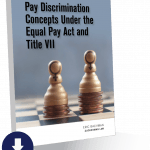
Call Our Pay Discrimination Lawyers Today to Get the Pay You Are Owed
The Equal Pay Act prohibits employers from discriminating on the basis of sex by paying wages at a rate less than the rate at which the employer pays wages to employees of the opposite sex … for equal work performed under similar working conditions. Damages in pay discrimination claims can be substantial. Recently, Uber Technologies paid $10 million to settle a pay discrimination class action.
EPAeGuide_ZuckermanLaw_FINAL (2)(publish)See Eric Bachman’s column in Forbes.com and his articles on gender pay discrimination issues:
- “Retention Raises May Be Unlawful Employment Discrimination, Says Federal Appeals Court”
- “Today is Equal Pay Day. Here’s what you need to know about the Equal Pay Act.”
- “Are Partners “Employees” or “Employers” In A Discrimination Lawsuit?“
- “Past Salary Cannot Excuse Excuse Gender Pay Discrimination”
- “Just Who Are You “Equal” To Under the Equal Pay Act?”
- “What Does It Mean To “Mitigate Your Damages” In An Employment Discrimination Case?”
- “Let’s Not Wait For The Next World Cup To Score Equal Pay For Women”
 Contact us today to find out how we can help you in a pay discrimination case. To schedule a confidential consultation, call Eric Bachman at 202-769-1681, or click here. See the December 2018 Women2.com interview of Eric Bachman: A Legal Leg for Women to Stand on in the Workplace.
Contact us today to find out how we can help you in a pay discrimination case. To schedule a confidential consultation, call Eric Bachman at 202-769-1681, or click here. See the December 2018 Women2.com interview of Eric Bachman: A Legal Leg for Women to Stand on in the Workplace.
U.S. News and Best Lawyers® have named Zuckerman Law a Tier 1 firm in Litigation – Labor and Employment in the Washington DC metropolitan area. Recently firm Principal Eric Bachman, in conjunction with co-counsel, secured a $1.3 million jury verdict in an age discrimination case.
Click here to see our videos answering frequently asked questions about discrimination and retaliation.



Gender Pay Gap Persists
A 2019 ADP Research Institute Study analyzing payroll data from 13 million employees from 30,000 firms across eight sectors found that women earn 79 percent of what mean earn.
And according to a Council of Economic Advisers issue brief about the Gender Gap, “median earnings for a woman working full-time all year in the United States totaled only 79 percent of the median earnings of a man working full-time all year. Phrased differently, she earned 79 cents for every dollar that he earned.”
Proving Equal Pay Act Discrimination

Once the EPA claimant has met that burden, the employer has the burden of demonstrating the applicability of one of the four affirmative defenses identified in the EPA:
- a bona fide seniority system;
- a merit system
- a system which measures earnings by quantity or quality of production; or
- a differential based on any factor other than sex.
See 29 U.S.C. § 206(d)(1).
Significantly, the employer must prove not just that proffered reasons could explain the wage disparity, but that the proffered reasons do in fact explain the wage disparity. An employer seeking summary judgment in an Equal Pay Act case must produce sufficient evidence such that no rational jury could conclude but that the proffered reasons actually motivated the wage disparity.
In the Third, Fourth and Tenth Circuits, an employer can avoid summary judgment only if it submits evidence from which a reasonable factfinder could conclude not simply that the employer’s proffered reasons could explain the wage disparity, but that the proffered reasons do in fact explain the wage disparity. This is a heavier burden than an employer’s burden to proffer a legitimate, nondiscriminatory reason for the challenged action in a Title VII case.
No Requirement to Prove that Two Jobs are Identical
An EPA claimant “does not have to prove that two jobs are identical but rather must show that the “skill, effort and responsibility required in the performance of the jobs are substantially equal.” Arrington v. Cobb County, 139 F.3d 865, 876 (11th Cir. 1998).
Work is “substantially equal” for purposes of the EPA if it requires “equal skill, effort, and responsibility.” 29 U.S.C. § 206(d)(l). This determination turns on the actual content of the job-not mere job descriptions or titles. EEOC v. Cent. Kan. Med. Ctr., 705 F.2d 1270, 1273 (10th Cir. 1983).
A woman in a higher-ranking job who is paid less than a man she supervises in a lower-ranking job can state a valid EPA claim even though the two jobs are by definition unequal. Riordan v. Kempiners, 831 F. 2d 690, 699 (7th Cir. 1987).
Strict Liability for Pay Discrimination Under Equal Pay Act
An EPA plaintiff need not allege discriminatory intent on the part of the employer. Ledbetter v. Goodyear Tire & Rubber Co., 550 U.S. 618, 640 (2007) (The EPA does not require a plaintiff to establish that his employer engaged in “intentional discrimination.”). Instead, a plaintiff need only plead that “employees of the opposite sex were paid differently for performing `equal work’—work of substantially equal skill, effort and responsibility, under similar working conditions.” Stanziale v. Jargowsky, 200 F.3d 101, 107 (2000). Thus, the employer need not have made the classification itself, but rather, it would be liable under the EPA, barring some affirmative defense, simply for paying employees of opposite sexes differently for performing equal work.
Once a plaintiff establishes a prima facie case, the employer has an opportunity to show that the disparate salaries are caused by a seniority system, a merit system, a production-quota system, or any factor other than sex. 29 U.S.C. § 206(d)(1). The plaintiff can still prevail if she shows that the justification for the pay disparity was pretextual. Unlike typical Title VII burden-shifting, the burden of proving an affirmative defense is a burden of proof, not merely a burden of production.
Equal Pay Act Protection Against Retaliation for Disclosing Pay Discrimination
To properly state a retaliation claim under the EPA, a plaintiff is required to show: (1) that she engaged in a protected activity; (2) that Defendants took some adverse employment action against her; and (3) that a causal connection existed between the protected activity and the adverse action. Holland v. Washington Homes, Inc., 487 F.3d 208, 218 (4th Cir. 2007).
Statute of Limitations for Equal Pay Act Claims
The statute of limitations for filing an Equal Pay Act claim two years from the date of the alleged unlawful compensation practice or, in the case of a willful violation, the statute of limitations is three years. The Lilly Ledbetter Fair Pay Act extends the statute of limitations for discriminatory compensation claims by clarifying “that a discriminatory compensation decision . . . occurs each time compensation is paid pursuant to the [discriminatory decision].” Pub. L. No. 111-2, 123 Stat. 5 (2009).
Liquidated Damages Under the Equal Pay Act
Where a pay discrimination claimant proves a willful violation of the Equal Pay Act, the claimant can recover liquidated damages.
Resources About Equal Pay Act Claims and Gender Discrimination from Pay Discrimination Law Firm
Pay discrimination claims under the Equal Pay Act versus Title VII: what is the difference?
EEOC Equal Pay Act Regulations
EEOC Compliance Manual Section on Compensation Discrimination
EEOC Facts About Equal Pay and Compensation Discrimination
If you have suffered pay discrimination, call the attorneys at Zuckerman Law at 202-769-1681 202-262-8959 or contact us by clicking here.
Equal Pay Act Pay Discrimination Lawyers
Hiring a proven and effective advocate is critical to obtaining the maximum recovery in an Equal Pay Act case. Eric Bachman, Chair of the Firm’s Discrimination Practice, has substantial experience litigating precedent-setting individual and class action discrimination cases. His wins include a $100 million settlement in a disparate impact Title VII class action and a $16 million class action settlement against a major grocery chain. Having served as Senior Trial Attorney in the Civil Rights Division of the Department of Justice and as lead or co-counsel in numerous jury trials, Bachman is trial-tested and ready to fight for you to obtain the relief that you deserve.
Bachman writes frequently on topics related to employment discrimination issues at the Glass Ceiling Discrimination Blog.
Contact us today to find out how we can help you in an Equal Pay Act discrimination case. To schedule a preliminary consultation, click here or call us at (202) 769-1681.
Click here to see our videos answering frequently asked questions about discrimination and retaliation.



| Washington DC | Maryland | Virginia |
|
1629 K Street, NW
Suite 300
Washington, DC 20006
(202) 769-1681
By Appointment Only
|
5425 Wisconsin Avenue
Suite 600
Chevy Chase, MD 20815
(202) 769-1681
By Appointment Only
|
1934 Old Gallows
Rd #350 Tysons, VA 22182
(571) 288-1309
By Appointment Only
|








